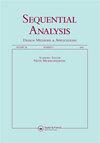Group-sequential response-adaptive designs for multi-armed trials
IF 0.6
4区 数学
Q4 STATISTICS & PROBABILITY
Sequential Analysis-Design Methods and Applications
Pub Date : 2023-04-03
DOI:10.1080/07474946.2023.2184831
引用次数: 0
Abstract
Abstract Several experimental treatments are often compared with a common control in a clinical trial nowadays. A group-sequential design incorporating response-adaptive randomization can help to increase the probability of receiving a more promising treatment for patients in the trial and to detect a treatment effect early so as to benefit the whole population of interest. With such ethical advantages, the trial design has invoked investigation using the Bayesian approach. In the frequentist approach, the type I error rate of a multi-armed trial may involve two error elements, the inflated error rates caused by multiple treatment comparisons and sequential testing. In this study, a group-sequential global test was considered. By monitoring the response-adaptive design at a continuous information time, calculation of the information time and two optimal response-adaptive sampling rules for multi-armed trials were described. Operating characteristics of the designs were investigated via simulation for censored exponential survival outcomes and using patient data sampled from a four-armed binary trial to demonstrate their practical applicability. Our results showed that, in general, the adaptive designs preserved ethical advantages in terms of reducing the average numbers of patients and failures compared with a group-sequential non-adaptive randomized design, while not adversely affecting the power.多武器试验的群序列反应自适应设计
摘要在临床试验中,经常将几种实验性治疗方法与一种共同对照进行比较。纳入反应适应性随机化的组序设计有助于增加试验中患者接受更有希望的治疗的可能性,并有助于及早发现治疗效果,从而使整个感兴趣的人群受益。有了这样的伦理优势,试验设计使用贝叶斯方法进行了调查。在频率论方法中,多臂试验的I型错误率可能涉及两个错误因素,即由多个处理比较和顺序试验引起的膨胀错误率。本研究采用组序全局检验。通过对连续信息时间下响应自适应设计的监测,给出了信息时间的计算方法和两种最优的多臂试验响应自适应抽样规则。通过对截尾指数生存结果的模拟,并使用从四臂二元试验中抽样的患者数据,研究了设计的操作特性,以证明其实际适用性。我们的结果表明,总的来说,与组序非适应性随机设计相比,适应性设计在减少患者和失败的平均数量方面保留了伦理优势,同时不会对功率产生不利影响。
本文章由计算机程序翻译,如有差异,请以英文原文为准。
求助全文
约1分钟内获得全文
求助全文
来源期刊

Sequential Analysis-Design Methods and Applications
STATISTICS & PROBABILITY-
CiteScore
1.40
自引率
12.50%
发文量
20
期刊介绍:
The purpose of Sequential Analysis is to contribute to theoretical and applied aspects of sequential methodologies in all areas of statistical science. Published papers highlight the development of new and important sequential approaches.
Interdisciplinary articles that emphasize the methodology of practical value to applied researchers and statistical consultants are highly encouraged. Papers that cover contemporary areas of applications including animal abundance, bioequivalence, communication science, computer simulations, data mining, directional data, disease mapping, environmental sampling, genome, imaging, microarrays, networking, parallel processing, pest management, sonar detection, spatial statistics, tracking, and engineering are deemed especially important. Of particular value are expository review articles that critically synthesize broad-based statistical issues. Papers on case-studies are also considered. All papers are refereed.
 求助内容:
求助内容: 应助结果提醒方式:
应助结果提醒方式:


